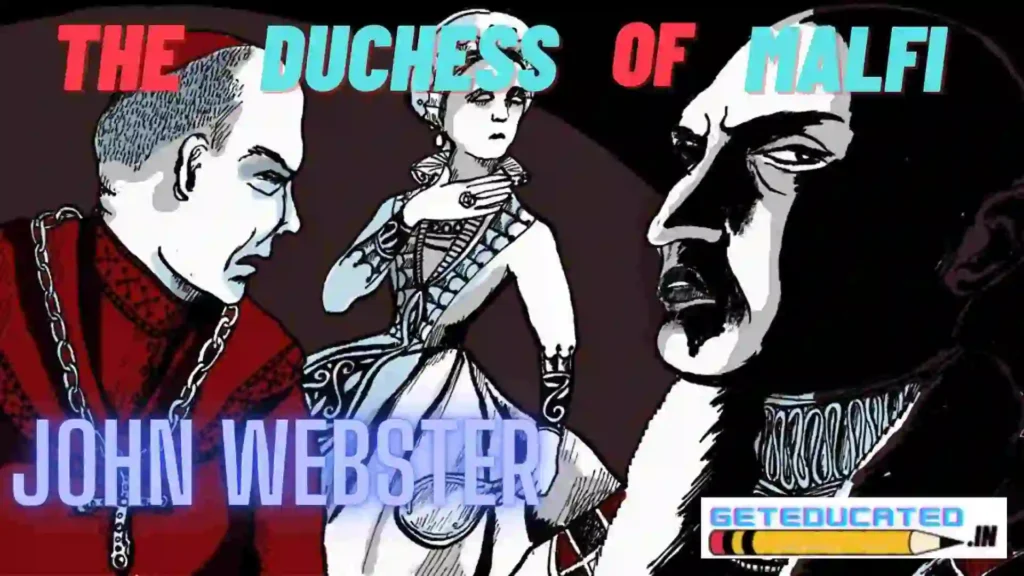
In the play the Duchess of Malfi, John Webster has shown his outstanding skill in characterization. He has created many significant characters in the play. The character of Bosola is essentially a remarkable character. The character of Bosola has a special place not only in the play “The Duchess of Malfi” but in the arena of Jacobean drama. In this play, Bosola is transformed from a villain to a tragic hero. At the end of the play, the dismal and bright in Bosola are skillfully blended by John Webster. The character of Bosola has a vital role in the play. Dr. Fermor describes Bosola as – “a villain in the beginning turns to be a tragic hero of the play.”
Besola is first presented as a malcontent:
The only court-gall; yet I observe his railing
Is not for simple love of piety:
Indeed, he rails at those things which he wants:
Would be as lecherous, covetous, or proud,
Bloody, or envious as any man,
If he had means to be so.
He committed a murder and he has served a sentence as a galleyslave. Yet he is not without some touch of decency, as Antonio insists:
Tis great pity
He should be thus neglected: I have heard
He’s very valiant; this foul melancholy
Will poison all his goodness.
“After the Duchess, the only character that holds us is Bosola. He too has some of the weakness of his victim, Antonio, his soul is perpetually a house of Beelzebub divided against itself, and doomed thereby to fall. His conscience turns his sting upon himself. His mixture of punctilio and unscrupulousness may seem unreal to the modern reader: it is not so to those who have a better knowledge of that age. Bosola, while clearly sympathising with the Duchess and to some extent with Antonio, continues to earn his pay. He would be really honest, were he sure that such a thing as honesty existed. His mouth grows bitter with a genuine anger at the vices of courts which seem to belie all human goodness. Yet he remains as helpless as Hamlet, his distant kinsman in the family of Malcon tents, to carry it into effect. He is cynical, yet furious, against hypocrisy his insight avails to show him only his own and the world’s degradation, too proud to flatter, he stoops to be a tool; and only when it is too late he deserts the side of sin, to earn the wages of death. The curse of the Stoic poet is upon him: his vision torments him with regret for the beauty of that goodness he has flung
away. He cies as he lived:
‘in a mist, I know not how’.”
“Bosola’s role in The Duchess of Malfi is broadly similar to that of Flamineo in The White Devil. But Bosola is by far the more complex character. His commitment to his course of life is both more deliberate and less whole-hearted; conflicting motives divide him; he wavers and changes. Bosola’s two earliest appearances complement each other. First he rebukes an ungrateful former patron, the Cardinal, then he gives a typically suspicious and ungrateful reception to a new patron, Ferdinand Cynically, he accepts the degrading employment (as a spy in the Duchess’s household). Nevertheless, he concludes the interview with a sentence
ostensibly stigmatizing his own behaviour.
He expresses his melancholy nihilism in a bitter verbal attack on an old lady which rapidly develops into an almost Swiftian assault on the physical corruption of mankind in general (11, i, 51-66). He lurks near the Duchess, on the alert for information that may interest his patron. Having won her confidence by praising Antonio, he immediately betrays it. From the time of her imprisonment, his conscience becomes more restive and he grows increasingly self-contradictory. His admiration for the Duchess’s bearing and his urging of
Ferdinand to spare her do not prevent him from supervising her torture and her death; his supervision of these is reluctant, however, and at the last moment he grows remorseful and even wishes to save her life. Her death tums him into the revenger we watch in Act V. Like Flamineo, he is an inveterate commentator upon all that comes within his view. His commentary is scornful, sombre, melancholy. Shortly before his death, he fomulates one of the lessons he has derived from his experience :
There are many ways that conduct to seeming
Honour, and some of them very dirty ones.
“Our interest in the figure of Bosola is not mainly because, in the service of Ferdinand’s mania, he murders the Duchess and brings about unwittingly the death of Antonio, but because of the strange discrepancy between the man he appears, the man he would be, and the man that, unknown to himself, he really is. Our interest is intense, first because we are watching the slow permeation of hi outer consciousness by this inner self, the slow summation of all bis findings in the knowledge of himself :
an actor in the main of all,
Much against mine own good nature….
and then because, when this self-knowledge has cleared away all illusion, he stands for a moment as near to truth as a man can stand. His eyes are fixed on reality and he reports it “a mist.” In com- parison with this, the ruin brought upon him by his helated resolve to “be mine own example” (V, iv, 89) is only incidental, one of those events that, in Webster’s drama, serve primarily the deeper purpose of showing where the thought is tending”
“Bosola sees himself as a Machiavellian, as clearly as ever did Flamineo, but it is a reflective Machiavellian, a man philosophizing upon ‘policy’ itself. To the court, however, he presents not quite :this character, but that of conventional melancholy villain, despising a world that has despised him, a disguise that is penetrated by the astute Antonio, who at the same time makes us aware of a third Bosola, the one who, underlying both of these, gradually emerges, to the point of self-recognition, as the play goes on :
Antonio. You would look up to heaven, but I think
The Devil that rules in the air, stands in your light.
Finally, the quality of compassion is allowed to develop in Bosola, first to the wrecking of his policy, then to the freeing of his understanding :
Fare you wellIt may be pain, but no harm to me to die
In so good a quarrel.
